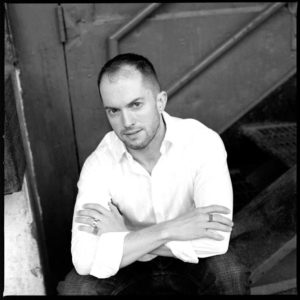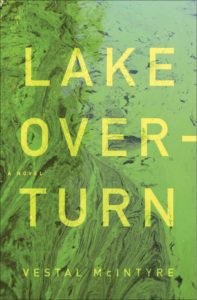He couldn’t wait to get out of Idaho, heading to Boston for college, then to New York where he waited first on tables and then for publication of his debut collection of short stories, You Aren’t the One. He has since settled in London, with his true love whom he met on a book tour.
 Thus established, Vestal McIntyre turned his attention to an opus about his home state. Who’d have thought it would turn out to be this lovely, even loving, vision, Lake Overturn, about some rather ordinary people in mid-’80s Idaho. The title refers to a rare natural phenomenon in which carbon dioxide erupts from a deep lake and suffocates all nearby life. In the novel, two junior high boys use the subject for a science fair project. The boys, who live with their single mothers in the same trailer park in the town McIntyre calls Eula, are two special cases. One is a bit autistic; the other is being bullied at school because he’s been labeled gay. The two families are among the dozens of well-drawn Eula citizens who go about their lives, most of them hopeful and good-hearted. McIntyre doesn’t use trailer park as a synonym for trashy folks. He notes that, as with towns, there are “good neighborhoods” and “bad neighborhoods” in trailer parks. He finds the poignancy in a town addict as she seeks to redeem herself and makes human a trendy couple from Seattle. He captures the importance of religion to the
Thus established, Vestal McIntyre turned his attention to an opus about his home state. Who’d have thought it would turn out to be this lovely, even loving, vision, Lake Overturn, about some rather ordinary people in mid-’80s Idaho. The title refers to a rare natural phenomenon in which carbon dioxide erupts from a deep lake and suffocates all nearby life. In the novel, two junior high boys use the subject for a science fair project. The boys, who live with their single mothers in the same trailer park in the town McIntyre calls Eula, are two special cases. One is a bit autistic; the other is being bullied at school because he’s been labeled gay. The two families are among the dozens of well-drawn Eula citizens who go about their lives, most of them hopeful and good-hearted. McIntyre doesn’t use trailer park as a synonym for trashy folks. He notes that, as with towns, there are “good neighborhoods” and “bad neighborhoods” in trailer parks. He finds the poignancy in a town addict as she seeks to redeem herself and makes human a trendy couple from Seattle. He captures the importance of religion to the typical Idaho populace and the longing of the young for a happy future. McIntyre, now 37, grew up in Nampa, near Boise, and though he left Idaho, he came back to write this 443-page novel. The book has been roundly praised by reviewers, including The New York Times.
typical Idaho populace and the longing of the young for a happy future. McIntyre, now 37, grew up in Nampa, near Boise, and though he left Idaho, he came back to write this 443-page novel. The book has been roundly praised by reviewers, including The New York Times.
We interviewed McIntyre by e-mail about his book, his name and his hometown. One thing is certain, Idaho: All is forgiven.
SVM | You have said your folks wanted to live in the country around animals, so you wound up in Nampa. Did you raise a 4-H calf, ride a horse and go whitewater rafting?
McINTYRE | We had a field with sheep and a horse, sometimes pigs and chickens, but we were half-hearted farmers at best. My friend Leslie across the road won a blue ribbon in 4-H with her goat, and this made me envious, so I got a rabbit and joined up. But I was too much of a TV addict to ever spend time training the poor thing, so when it came time for the 4-H Rabbit Show, my rabbit was completely wild. He actually bit one of the judges. They still gave me a silver ribbon. They were handing out ribbons right and left like religious tracts.
It’s funny, we lived in Idaho but took little advantage of what Idaho has to offer. I never went skiing until earlier this year—in Slovakia, of all places! It was rainy and the food was horrible.
SVM | Did you love or hate Idaho?
McINTYRE | I hated it growing up, but I like it now. In high school, I dreamed of getting out and living in New York City. I had never been to the East, and my idea of New York came from Woody Allen movies. But I did—I went to college in Boston, then moved to New York and lived there for 13 years. Now I love going back to Idaho. It took leaving for me to be able to appreciate its beauty.
SVM | You were the baby of the family. How did that inform your writing?
McINTYRE | I don’t think I’d be a writer if I wasn’t a youngest child. I had a unique position, watching my siblings grow up, make mistakes, enter and leave relationships. I was a real observer, and I use a lot of incidents from their lives in my writing. Aside from a few nonfiction essays, though, I don’t use them as characters. Characters are tiny things, when you think about it. You have to try to make them feel real and full, even though the reader is only glimpsing this and that bit of their thoughts and experiences. Real people are huge, un-capturable.
SVM | How did you decide to be a writer?
McINTYRE | Growing up, I was always writing. If a teacher’s mother died, I’d write a sappy little poem of condolence and the other kids would decorate it with drawings. From the age when you can seriously think about these things, I wanted to be a writer. My sister Casandra always encouraged me by sending me the books she was reading in college and reading my stories. My first book was dedicated to her. Also, I had a teacher when I was a junior in high school, Jennifer Sohn, who made me feel like I could really be a writer. She was encouraging just when I needed it. We’re back in touch now, and she’s absolutely elated that I’ve been published. We’ve talked a lot about Lake Overturn.
SVM | You’ve said you first went to a Nampa church school where you were made fun of as a “sissy.”
McINTYRE | Nampa Christian School was pretty small—there were only twenty-some kids in my class, and we all grew up together. I was an expressive, creative kid, bordering on loud, and throughout grade school I felt like I was well-liked. In seventh grade, we moved to the high school building. Some of the older kids noticed I was somewhat effeminate, and started teasing me pretty persistently and openly in the halls. In that closed environment, word spread pretty quickly. I became the “school fag,” and my life completely changed. In the hope that they would stop targeting me, I changed the way I walked and acted and became quiet. I really shut down.
At home, I begged my parents to let me go to public school and made up all these reasons why it would be better for me (more foreign language classes, etc.) because I couldn’t tell them the real reason. After ninth grade, they gave in. I went to public school and, just as I had predicted, it was better. There was a small group of weirdos for me to join, and my brother Evan was there, having been kicked out of Nampa Christian earlier for bad behavior. Evan and I were great friends, so I was set.
SVM | You’ve said that besides yourself you have three gay siblings, brothers and sisters. How did your parents handle that?
McINTYRE | It was very difficult at first, especially for my mother who was deeply religious and had led a sheltered life. She said she hadn’t even known gay people existed growing up! But she and my dad both loved us a lot and were open-minded, intelligent people. My mother ended up standing up for us in church. American Baptist churches all had to vote whether they’d be “open and affirming” or “open and transforming” to gay people. (Transforming, meaning gays and lesbians would have to become straight in order to stay members.) My mom stood up at a deacon’s meeting and said, “I have four gay children, and they grew up in this church and we need to make them feel welcome!” This, from a woman who, a few years before, could not get the word “gay” out of her mouth! I tell that story all the time—I’m so proud of her.
SVM | Nampa is now the second largest city in Idaho. Was it more a small town then or a suburb of Boise?
McINTYRE | We were very separated from Boise. I mean, there was another town, Meridian, in between. Weekends, we would sneak out after our parents had gone to bed and go to the Boise dance club, Déjà Vu, where it felt very urban and glamorous. Nowadays, people go back and forth daily as part of their routine, but it was different back then.
I feel ambivalent about what’s happened to Nampa. Growing up, you could look out the window of my parents’ bedroom and see fields, uninterrupted all the way to Squaw Butte, and it was very peaceful under that big sky. Now it’s all subdivisions and warehouses.
Sprawl has its ugly side—it’s horrible for the environment and detrimental to the beauty of the landscape—but on the other hand, people who aren’t rich can have their bit of space with a lawn and some rose bushes. And the kids growing up there feel less isolated from the world at large.
SVM | You’ve included so many recognizable Idaho “types.” You seem particularly cued in to the deeply religious.
McINTYRE | Well, I was deeply religious growing up. So were my parents, and my brother, who’s now a missionary in Bangladesh. And I grew up with Mormons and Mexican-American Catholics. Part of what was fascinating about Idaho, when I looked at it as an adult outsider after the space of many years, was the enormous, life-consuming strength of God in people’s lives. I live in London now, which is as secular a society as I’ve encountered. It’s hard to get people here to understand how powerful religion is in America. To make an honest attempt at portraying this small town, Eula, I had to include the different types of people who live there and their religions.
SVM | I loved the line in your book where you said one character had never met a black person. So where did you get the courage to face the great unknown East Coast with its wildly diverse population. Did your siblings follow suit?
McINTYRE | They didn’t follow suit, they led the way. Most of my siblings went to college outside of Idaho. My mom was sad to see us all move away, but she couldn’t have been very surprised. We were always a kind of misfit family in Nampa—we were politically liberal, bordering on socialist, and we kept to ourselves. Mom and Dad were great in that they encouraged learning and individuality and a fascination with the world—it’s sad that they then suffered the consequences of having us all move far away.
SVM | What are you working on next?
McINTYRE | I’m writing short stories based on my years in New York City. I was glad to leave, but it really was my home and I know it well. My approach to these stories is completely different. Lake Overturn has its moments of irony, but in general it’s as emotionally honest as my writing gets. I’m having fun now, writing bitchy dialogue and having my characters go to parties and drink.
SVM | So where did you get the name Vestal?
McINTYRE | I was named after a friend of my grandmother’s family in Denver, Vestal Brown. He died when I was little, and no one had the sense to ask him where he got his name from.
I know the “Vestal Virgins” were priestesses in service to the Roman goddess Vesta, and the only ones in Rome to get their own chariots. Otherwise, I’ve heard of only one other person named Vestal: a female gospel singer, who (luckily for me) has remained pretty obscure. I much prefer the question, “Vestal, as in Vestal Virgins of ancient Rome?” over “Vestal, as in that enormous white woman who sings with a choir on TV Sunday mornings?”

